Carl E. Olson's Blog, page 229
March 22, 2012
NYTime's reporter sneers at Santorum's "far right Catholicism"; "dour 13th-century philosophy"
The opening of my recent post on the Catholic World Report blog:
I'm starting to think that the only different between a Maureen Dowd screed and a New York Times' news piece is that the former is likely more objective, balanced, and charitable than the latter. Here is what Timothy Egan, Pulitzer Prize-winning reporter, wants readers to believe about Rick Santorum:
• He's irrational: "If Romney has indeed finally sealed the deal after Tuesday, he will owe his nomination in large part to common-sense Catholics who rejected a less rational one of their own." Because we all know that Catholicism should be the Religion of Polls, unlike the Religion of Peace, which doesn't seem to care much at all what the polls or liberal reporters have to say.
• He's an extremist: "Santorum's far-right Catholicism will not put the Catholic vote in the Republican column in November. Barack Obama won Catholics 54-47, just slightly better than he did over all." Be assured, however, that you'll not hear any use of phrases such as "Obama's far-left secularism", or any cogent analysis of how the majority of self-described Catholics in the U.S. are exactly that: self-described.
Continue reading on the CWR site.
"Healing, Reparation, and Renewal": On the Apostolic Visitation to Ireland
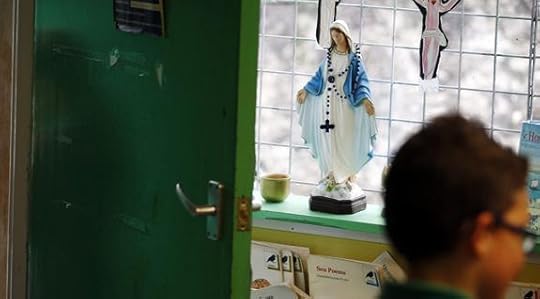
"Healing, Reparation, and Renewal" | by Michael Kelly | Catholic World Report
The apostolic visitation to Ireland calls for changes in seminaries, religious communities, and the larger Catholic community—and leaves the door open for serious structural changes at the diocesan level.
Dissent from the Church's teaching can never offer an authentic path to Church renewal, the Vatican's apostolic visitation to Ireland has warned.
In a summary report issued March 20, the Holy See also praises the enduring faith of Irish Catholics in the midst of the clerical sexual abuse scandals.
The apostolic visitation was ordered by Pope Benedict XVI in a March 2010 pastoral letter to the Catholics of Ireland as a means to assist the Church in Ireland "on her path of renewal."
The Holy See used the seven-page report on the visitation's findings to re-echo "the sense of dismay and betrayal…regarding the sinful and criminal acts that were at the root of this particular crisis."
The Church in Ireland has struggled to come to terms with revelations of abuse of minors by priests and religious, as well as the subsequent decades of inaction and cover-ups by some bishops and religious superiors. The visitation report notes that "with a great sense of pain and shame, it must be acknowledged that within the Christian community innocent young people were abused by clerics and religious to whose care they had been entrusted, while those who should have exercised vigilance often failed to do so effectively."
However, while the report gives a lot of attention to victims and the continued need for Church leaders to reach out to those who have been abused, the renewal of the Church in Ireland appears at the heart of the document. It points out that "healing, reparation, and renewal" are what Pope Benedict XVI "so eagerly desires for the beloved Church in Ireland."
Changes to seminary life
The visitation to Irish seminaries—which was led by Cardinal Timothy Dolan of New York—noted that while "there are dedicated formators in Irish seminaries committed to the work of priestly training," bishops needed "to show greater concern for the intellectual formation of seminarians, ensuring that it is in full conformity with the Church's Magisterium."
March 21, 2012
Church-State Separation and the Obama Mandate

Church-State Separation and the Obama Mandate | Paul Kengor | Catholic World Report
A mistaken understanding of the separation of church and state has shaped the debate over the contraception mandate.
"The beliefs of Catholics should have no impact on government policy," yelled a voice from my kitchen radio, a talk-radio caller, a medical doctor. "We have separation of church and state in this country!"
The caller's sentiment is far too common. For too long, this country has suffered under the yoke of a severely misguided understanding of church-state separation, fostered by secular liberals/progressives. And now, those same forces—or at least those devoted to President Obama and "abortion rights" above all else—are employing that very misunderstanding in an assault upon the religious freedom and consciences of Catholics and many other believers. They are doing so, of course, via the Obama-HHS mandate on contraception and abortion drugs.
The problem begins with the very notion of "separation of church and state." Huge numbers of Americans mistakenly believe that those words are found in the Constitution, thus ascribing to them a tremendous weight and power that plainly do not exist. These words are revered as if they were the first words chiseled into the First Amendment. They are not. They are not found in the Constitution at all.
As a professor and lecturer, I have dealt with this mistaken notion my whole career. I'll never forget a moment when giving a talk on the faith of Ronald Reagan at the National Presbyterian Church in the nation's capital, a church Reagan attended as president. The talk was well-received, except for an elderly gentleman who approached me afterward with fury in his eyes. He leveled his finger at me and angrily wanted to know how a Christian like myself could bear such "false witness," and in a church of all places. What had I allegedly lied about? "You didn't tell us about the Constitution's separation of church and state!" the man steamed. "Ronald Reagan was not allowed, under our Constitution, to bring his personal faith into the public square!"
Right there, at that moment, was a display of everything wrong in this debate, which liberals have nurtured for a long, long time. So long, in fact, that this educated, well-off, well-dressed Washingtonian had been a victim well into his late 80s.
The Emptiness and Deceit of Cave-in "Catholicism"
"The Bishops speak for the Catholic and apostolic faith, and those who hold that faith gather around them. Others disperse." — Francis Cardinal George (Feb. 14, 2012)
It is no surprise that dissenting, protesting Catholics—those I've lately been calling "cave-in Catholics", in homage to Cardinal Dolan's retort to the weak-kneed editors of America magazine—thumb their noses at papal speeches, conciliar texts, and formal, Magisterial teaching. What is somewhat curious is how they try to justify their disdain for popes, bishops and the dread "Vatican" by simply saying, "After all, very few Catholics in the U.S. pay attention to Church teaching anymore. See this poll! Watch this interview! Check out these stats!"
What is far more curious is how these cave-in Catholics—having indeed caved-in to the dominant beliefs about contraception, abortion, cohabitation, homosexuality, and so forth—think this "argument" is both pure genius and completely unassailable. But such Catholics are not, when all is said and done, truthful with the facts, willing to face the truth, or interested in seeing how truth, facts, and the Catholic faith are not only compatible, but are competely and fully compatible.
Let's take a couple of examples, both courtesy of the Pompous Journal for Advanced and Agitated Bashing of Catholicism, more circumspectly known as The New York Times. Last month, a Notre Dame professor of philosophy, Gary Gutting, wrote an essay, "Birth Control, Bishops and Religious Authority" (Feb. 15, 2012). Gutting begins by saying that what interests him "as a philosopher — and a Catholic — is that virtually all parties to this often acrimonious debate have assumed that the bishops are right about this, that birth control is contrary to 'the teachings of the Catholic Church.' The only issue is how, if at all, the government should 'respect' this teaching."
He then takes a clever but misleading tact:
As critics repeatedly point out, 98 percent of sexually active American Catholic women practice birth control, and 78 percent of Catholics think a "good Catholic" can reject the bishops' teaching on birth control. The response from the church, however, has been that, regardless of what the majority of Catholics do and think, the church's teaching is that birth control is morally wrong. The church, in the inevitable phrase, "is not a democracy." What the church teaches is what the bishops (and, ultimately, the pope, as head of the bishops) say it does.
But is this true? The answer requires some thought about the nature and basis of religious authority. Ultimately the claim is that this authority derives from God. But since we live in a human world in which God does not directly speak to us, we need to ask, Who decides that God has given, say, the Catholic bishops his authority?
This is, as I say, clever, and is so on a couple of counts. It begins by playing the "democracy" card (to be pushed further a bit later), which is always a sure way to get on the good side of most Americans. After all, what right do those people (the popes, bishops, etc.) have to tell you and me what to think, how to act, what to believe?
Gutting then insinuates that what the pope and bishops of today are teaching adds up to little more than personal opinions based in narrow-minded, self-serving subjectivity, as if the pope—without precedence, good reason, or theological justification—mindlessly drones, "Contraception bad. Abortion bad. Barney bad." This naturally leads to an appeal based in the "I'm not religious; I'm spiritual" school of arrested development so in vogue today. The pope is presented as an aloof and arrogant authority who claims that he alone is the mouthpiece for God. The reader, of course, is supposed to dutifully nod and say, "Golly, that's seems unfair. No one has dibs on God. Pass me the Cheetos."
March 20, 2012
Catholics and Capital Punishment

Catholics and Capital Punishment | Carl E. Olson | Catholic World Report
A look at the Catholic tradition on this hot-button issue, from the Old Testament to Evangelium Vitae
The topic of capital punishment has become, in recent decades, a contentious and increasingly confusing one among Catholics. Some Catholics insist the Church has finally—and authoritatively—renounced the death penalty. Some argue further that the death penalty is no different than abortion or euthanasia, and that supporting any of these acts rends the "seamless garment" of Church teaching regarding the dignity and value of life. And not a few go so far as to say that no one deserves the death penalty, for it is cruel and unusual punishment not fit to be supported by Christians.
What, then, to do with Scripture, which does not reject the death penalty, but accepts it—in the New and Old Testaments—as legitimate and necessary? Rulers, St. Paul told the Romans, "are not a terror to good conduct, but to bad." The one who exercises proper political authority is a servant of God who works for the good of citizens. "But if you do wrong, be afraid, for he does not bear the sword in vain; he is the servant of God to execute his wrath on the wrongdoer" (Rom. 13:3, 4). The Church teaches that the State, wielding an authority granted by divine law and grounded in natural law, is able to punish those who violate laws and inflict damage on society. "It is the role of the state," remarks the Catechism of the Catholic Church, "to defend and promote the common good of civil society, its citizens, and intermediate bodies" (par. 1910).
Pope Pius XII, in an address given September 14, 1952, made a significant remark that is often quoted in debates about capital punishment:
Even when it is a question of the execution of a condemned man, the State does not dispose of the individual's right to life. In this case it is reserved to the public power to deprive the condemned person of the enjoyment of life in expiation of his crime when, by his crime, he has already disposed himself of his right to live. ("The Moral Limits of Medical Research and Treatment," an address given to the First International Congress on the Histopathology of the Nervous System, par. 33)
The State, in other words, can carry out due punishment as an instrument of God, yet a murderer is worthy of strong punishment regardless of whether or not he is caught, tried, and convicted. As philosopher Michael Pakaluk has noted, if only two people were left on earth, and one killed the other, the murderer would still merit death for his action. Why? Because authentic justice is rooted in objective truth about good and evil.
Three basic forms of justice
Justice is traditionally defined as giving to each his proper due.
March 19, 2012
A Prayerful Meditation on St. Joseph
From a Homiletic & Pastoral Review article by Dr. Edouard Belaga:
If anyone had a special insight into the parable of the hidden treasure, it was unquestionably St. Joseph: "The kingdom of heaven is like treasure hidden in a field, which someone found and hid; then, in his joy he goes and sells all that he has and buys that field. Again, the kingdom of heaven is like a merchant in search of fine pearls; on finding one pearl of great value, he went and sold all that he had and bought it" (Mt 13:44-46). Is that great pearl a "what" or a "who"? According to Fr. Raniero Cantalamessa, OFM, Cap., the preacher of the papal household, "the hidden treasure, and the precious pearl, are nothing other than Jesus himself" (Gospel Commentary for 17th Sunday in Ordinary Time, July 2008). What is it about Joseph, in this month of March, his month, that would have given him special insight into the hidden ways our Lord lived and worked?
Our Church extols Joseph's treasures of holiness and beauty, his heroic and silently paternal vocation, hidden for centuries. St. Joseph was, for too long, either forgotten or worse, neglected and ridiculed: "Very early, indeed (from the second century), the apocryphal gospels—the more or less, golden legends—transformed St. Joseph into a feeble old man, sometimes silly and ridiculous, as in some mysteries of the Middle Ages. And, suddenly, all the admiration, all the tenderness, all the praises of the faithful went to Mary and Jesus by neglecting this shadow, this caricature of a man who accompanies them. … How, then, to marvel at this mismatched couple of a very young woman and an old man? How not think about it as a pseudo-marriage, a social facade without inner truth?" (Abbé Henri Caffarel, the founder of Équipes Notre-Dame, 1983.)
"The Importance of Knowing St. Joseph" by Fr. Benedict Groeschel, C.F.R.

The Importance of Knowing St. Joseph | Fr. Benedict Groeschel, C.F.R. | The Introduction to The Mystery of Joseph by Marie-Dominique Philippe, O.P. | Ignatius Insight
The publication of this serious, even profound study of a person intimately joined to the life of the Messiah and written by one of the most respected figures in our contemporary Catholic scene should cause serious attention to be paid to the often neglected figure of Saint Joseph.
Father 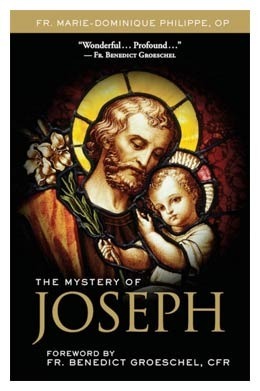 Marie-Dominique Philippe, O.P., an important French theologian who died only in 2006, was a man whose thought was of great influence and depth. He was also a man greatly devoted to the Church who founded the Community of Saint John. This new community is now recognized in several countries as a very successful attempt to restore a vibrant spirituality to the religious life, which in many places has seemed moribund for years.
Marie-Dominique Philippe, O.P., an important French theologian who died only in 2006, was a man whose thought was of great influence and depth. He was also a man greatly devoted to the Church who founded the Community of Saint John. This new community is now recognized in several countries as a very successful attempt to restore a vibrant spirituality to the religious life, which in many places has seemed moribund for years.
The Brothers and Sisters of Saint John are a cause of hope to those who look ahead to the restoration of the authentic and powerful traditions of the religious life that have gotten lost in recent times. The Franciscan Friars and Sisters of the Renewal have welcomed them with joy.
Father Philippe's book on Saint Joseph is very consistent with the new biblical theology called for by Pope Benedict XVI. The author very impressively examines the sparse facts that we have concerning the life of Saint Joseph, teasing from them material that connects easily and well with a very impressive structure of theological teaching. This then becomes a means of providing a firm foundation for devotion to the Foster Father and Guardian of the Son of God.
Except for Christ and Saint Paul, New Testament figures attract little attention from the secular world and especially the secular media – even when they are in a kindly mood. Occasionally a small amount of attention is shown to the figure of the Blessed Mother but rarely is Saint Joseph or any of the Apostles mentioned. Even in cities named Saint Joseph or San José are the inhabitants really conscious of the fact that their hometown is actually named for a person – a person who played a role of immense importance in God's plan of redemption for humankind. This apparent obscurity finds at its root a kind of Protestantism that is focused intensely on the figure Christ and on the writings of Saint Paul, but which seems barely acquainted with Saint Joseph and even the Mother of God, herself.
Catholic theology, which takes a less constricted view of such things, opened up a world of devotion to Saint Joseph the humble carpenter of Nazareth as well as to the Mother of God. How could it be otherwise? These are the figures who stood at the manger on the first Christmas; they are the ones to whom the care of the Word Incarnate was entrusted by God.
In recent years there has been a gradual but very welcome return to biblical theology and a simultaneous turning away from the overly exclusive use of the historical-critical method. In the wake of such changes there has also come a resurgence of interest in the figure of Saint Joseph. When we place the few facts that we have of him in the context of his personal responsibilities for the Messiah, we begin to move away from the shadowy figure presented in Scripture and discover a multi-dimensional person – one still wrapped in mystery, but one of great importance.
Young Catholics seeking more solid theological food than what is generally being fed to them through the historical-critical school alone will find in Father Philippe's book much to feed their spiritual lives and inspire their devotion.
Father Philippe has profoundly moved many of these intelligent and well educated young men and women, and quite a few of them have joined the community he founded.
The Community of Saint John now includes not only members from France but also from many parts of the world. The same spirit and insight that led Father Philippe to such success in the founding of this congregation can be found in his writings, which I recommend to all. The Mystery of Joseph is a wonderful place to begin your appreciation of Father Philippe. His way of looking into Scripture and finding in it an inexhaustible theological reservoir is an inspiration to all. Read and enjoy and pray. Father Philippe will teach you much about Saint Joseph and much about your faith. When you're all finished you will be quite surprised to see how your vision of this great saint may have changed. Even if you've been devoted to St. Joseph for many years, I feel safe in saying that in The Mystery of Saint Joseph you will learn a great deal about Jesus' Foster Father's true and undying importance.
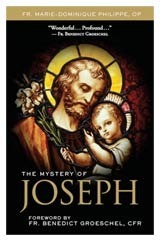 The Mystery of Joseph
The Mystery of Joseph
By Fr. Marie-Dominique Philippe, O.P.
Foreword By Fr. Benedict Groeschel
Although the greatest of saints, after Mary, St. Joseph is perhaps the least well understood. What Scripture teaches is compelling, but mysterious: he moves quietly and thoughtfully through its pages, almost unobserved in his humility and silence.
And yet Pope Paul VI has said: "If we look carefully into this life that was apparently so unremarkable, we shall find that it was greater and more adventurous, more full of exciting events, than we are accustomed to assume in our hasty perusal of the Gospel."
In this illuminating book, Fr. Philippe leads you deep into the beautiful mystery of St. Joseph - revealing the greatness of the apparently unremarkable man who was the guardian of Jesus and Mary, and who is now the Guardian of the Church, "overflowing with immeasurable wisdom and power."
Weaving together the many different strands of the Church's ever-deepening understanding of St. Joseph, along with his own profound insights, here is a warm and moving portrait of the humble, heroic carpenter of Bethlehem - a great man who became, by God's grace, a great saint. After reading this book, you will never see St. Joseph (and perhaps yourself) in quite the same way again.
"This is an amazing book on a crucial (but neglected) topic, written by one of the greatest Catholic theologians of recent times. Profound and deep, clear and practical, grounded in Scripture and illumined by the brilliance of St. Thomas Aquinas — I know of no other book like it." — Dr. Scott Hahn
"In this beautiful book one of the great men of the Church of recent times helps us to contemplate the face of St. Joseph in all its chivalrous nobility, and to understand how the mystery of Our Lady's 'spouse most chaste' supplies the Church with a light in which she can move forward on her pilgrimage 'with a new surge of life and love.' " — Fr. John Saward, author Cradle of Redeeming Love
"In recent times, St. Joseph seems to have fallen out of favor in the conscious minds of believers. These deep meditations are a wonderful antidote for that. I highly recommend The Mystery of Joseph." — Archbishop John J. Myers
"If St Joseph has a role in the Incarnation and its consequences – and he does – then he is an essential figure within our religion. The silence of St. Joseph in the New Testament can lead us to neglect him or see his role as minor. Fr. Philippe's book brings out the significance of the events of Joseph's life, and shows us his hidden greatness." — Cardinal George Pell
"In these gentle meditations, Fr. Philippe draws out of the Gospels a mystical theology of who St. Joseph is, and what he represents." — Aidan Nichols, O.P., author of Rome and the Eastern Churches
Fr. Marie-Dominique Philippe, O.P. (1912-2006) was the founder of the Community of St. John. A prolific author, he is increasingly recognized as an important theologian of the later 20th century.

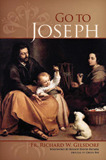
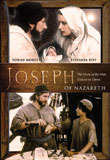
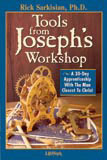
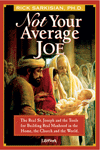

Cuban government detains protest group Ladies in White, others
From BBC News, this bad news:
Cuban police have arrested dozens of opposition activists, a week ahead of a visit by Pope Benedict XVI.
Most of those detained are members of the protest group Ladies in White, who are demanding the release of political prisoners.
Many were stopped as they staged their silent weekly protest march along an avenue in the capital, Havana.
The group says the country's Communist authorities have increased pressure on them in recent days.
The government says they are paid by the US to undermine Cuba's revolution.
The Ladies in White (Damas de Blanco) usually attend Mass together and then stage a protest march outside calling for the release of all political prisoners. ...
A group spokeswoman said that 19 of its members had been detained on Saturday evening while trying to stage a march in central Havana. Three have since been released without charge.
On Sunday morning, police detained another 36 members of the group - including leader Bertha Soler - as they made their way to attend Mass together in Havana.
After the church service, 22 women and two men were arrested as they marched to the city centre, trying to go beyond a route that has recently been tolerated by the authorities.
For a detailed look at the Ladies in White and their activism on the behalf of political prisoners in Cuba, read Daniel Allott's May 2011 article for Catholic World Report, "Cautious Defiance". Allott writes:
The Pope and Mexico's Spiritual Crisis

The Pope and Mexico's Spiritual Crisis | Matthew Cullinan Hoffman | Catholic World Report
Pope Benedict XVI prepares for trip to a Mexico torn by violence on the street—and in the womb.
Pope Benedict XVI's upcoming trip to Mexico will bring the pontiff to a country much transformed since the path-breaking visits of his predecessor, Pope John Paul II, whom some credit for the radical changes that have delivered the nation from the 80-year stranglehold of an anti-Catholic party dictatorship, and inaugurated a new era of democracy and individual freedom.
For the first time since the rise of the ultraliberal and anticlerical regime of Benito Juarez in the 1850s, a nominally pro-Catholic party has taken the reins of federal power in Mexico, and Church authorities speak with unprecedented freedom. The poverty and extreme poverty rates of the country have fallen significantly in recent years, multiple political parties compete for public office, and the press enjoys a liberty of expression that is virtually complete.
The democratist individualism of the new Mexico, however, has come at a price. Vicious narcotraficking gangs are vying for control of key points in the Western Hemisphere's supply route for the rich markets of the United States and Canada, and their internecine wars and conflicts with government forces have claimed over 47,000 lives in only five years.
Looming even above the massive death toll from the country's drug wars is the fact of 75,000 unborn children killed in the nation's capital, Mexico City, since the legalization of abortion in 2007, a massacre of innocents that the country has not seen since the end of Aztec rule. Added to the death toll are millions more that will never be conceived, as contraception lowers the birthrate below replacement level. While Mexico is advancing economically, demographically and morally the nation is in stark decline.
There is little doubt that Pope Benedict had Mexico's spiritual crisis in mind when he decided to visit the country in its Catholic heartland, in the southwestern state of Guanajuato. The state and its environs remain one of the few strongholds remaining to the Church in a society that is increasingly besieged by what Pope John Paul II called the "culture of death"—the anti-life and anti-family consensus embraced by global elites and international foundations, which is making devastating inroads in this historically Catholic country.
Tension grows between Church and State
In Mexico, Pope Benedict will find a Catholic Church that enjoys and unprecedented freedom from government interference, but whose doctrines are ever-less heeded by an increasingly secularized society. Mass attendance and priestly vocations continue to be low, as they were when John Paul II last visited in 2002. Non-Catholic sects are on the rise, and Catholicism is declining, as it has in much of Latin America since Vatican II.
March 18, 2012
Coming soon: "Letters to Gabriel: The True Story of Gabriel Michael Santorum"
Available this month from Ignatius Press: 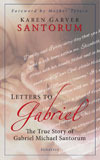 Letters to Gabriel: The True Story of Gabriel Michael Santorum
Letters to Gabriel: The True Story of Gabriel Michael Santorum
by Karen Santorum | Foreword by Mother Teresa
This moving collection of intimate, poignant, and heart-warming letters was written by Karen Santorum to her unborn child, Gabriel Michael. During her pregnancy, Karen wrote letters to her son, never expecting that the letters would someday be published. Though her pregnancy began as normal, Karen ended up experiencing serious difficulties with her pregnancy at the same time that her husband Rick Santorum, the Republican Senator for Pennsylvania, was leading the charge against partial birth abortions in the U.S. Senate.
Letters to Gabriel is the story of Gabriel Michael's short, but meaningful life, and a tribute to the sanctity of life, the deep faith of the Santorums, and strong family values. The intimate bond between mother and child is expressed by Karen with great tenderness and love. This is a deeply moving book that will touch the heart of its readers with the beauty of the gift of life, and inspire them to share it with others.
Karen Garver Santorum graduated from the Western Pennsylvania Hospital School of Nursing in 1983, and worked as a registered nurse in a neonatal intensive care unit caring for premature and very sick infants. She graduated from Duquesne University with a Bachelor of Science in Nursing degree in 1986, and then went on to get her Juris Doctorate degree from the University of Pittsburgh Law. Karen is married to former Senator Rick Santorum of Pennsylvania and is the mother of their seven children.
"May God bless Richard and Karen Santorum, and console them with the knowledge that their son is in Heaven. May Mary, the Mother of Jesus, use these inspiring letters to encourage all expectant mothers to cherish the gift of life they carry, and to love the child within their womb."
- Mother Teresa
"A courageous and deeply moving account. A story filled with hope, faith and courage."
- Charlton Heston
"When the Santorums received a blessing named Gabriel, they suddenly experienced the reality at the heart of a public policy argument about respect for life. This is their story."
- George F. Will
"This moving book quietly and lovingly reminds us why, and for what, we truly grieve: not our own lives, but the loss of others. Highly recommended."
- Gary L. Bauer
"Karen Santorum's incredible book is both powerful and tender. It is a profound reminder that human life is created and loved by God for his own purpose."
- Cal Thomas
Carl E. Olson's Blog
- Carl E. Olson's profile
- 20 followers



